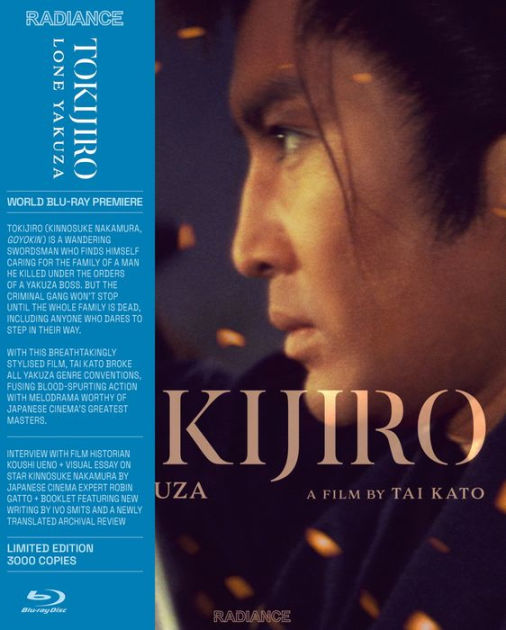Tokijiro: Lone Yakuza, originally appearing as a stage play in the 1920s and being adapted to film several times since then, is the story of a wandering samurai named Tokijiro (Kinnosuke Nakamura) who works for gangsters in exchange for shelter for the night. They give him a bed and food, and he agrees to kill someone for them. It doesn’t exactly seem like an even deal to me, but that’s the life of a matatabi. Early on, we watch as Tokijiro cuts down a seemingly honest, forthright man named Sanzo who tells Tokijiro his dying wish asking Tokijiro that his wife Okinu (Junko Ikeuchi) and son Tarokichi are looked after. Tokijiro, tired of his life as a yakuza-for-hire, abandons the gang and agrees to take care of Sanzo’s family. When Okinu is taken gravely ill, Tokijiro must pick up his blade once more to ensure she and Tarokichi are taken care of.
Tokijiro: Lone Yakuza is a prototypical and wonderfully produced chanbara courtesy of director Tai Kato, both simply plotted yet expressionistically shot and acted, creating a film that paints the genre in broad strokes while offering small but consequential character moments interspersed with big speeches and bright red sprays of blood. Kinnosuke Nakamura is excellent in the lead role. You get a sense for how someone like him could fall into this line of work while also being completely disenchanted by it. The dynamic between he and Okinu is also interesting. She sees him for who he really is, both the good and bad and isn’t afraid to leave him when the grief for her dead husband overwhelms her. Cinematographer Osamu Furuya, who put in a lot of great work for Toei in the ’60s and ’70s, gives us a very nicely photographed film, reliant on subtle shades of blue punctuated with bright red. It’s a color motif that really pops when applied but isn’t overused.
The transfer for Tokijiro: Lone Yakuza arrives as a HD digital file provided to Radiance by Toei, much like their previous Toei releases. The scan is on the whole pretty clean and well-balanced and while the grain appears a little heavy at times, overall Furuya’s shot and color composition is represented quite well. The mono audio track is also clear and hiss free with the dialogue put front and center over incidental sounds. For extras, first we have an interview with film critic Koushi Ueno who does a good job covering Tai Kato’s career and Tokijiro: Lone Yakuza‘s impact on Japanese cinema. The disc also includes a visual essay entitled Young Master that focuses on the career of actor Kinnosuke Nakamura and is also a nice, informative featurette to check out. Lastly like all Radiance LE releases, the disc includes a physical booklet that includes an essay by Professor of Arts and Culture of Japan at Leiden University Ivo Smits which includes a lot of good information on the history of the matatabi (wandering gambler) story and how Tokijiro: Lone Yakuza, which Smits considers a masterpiece period drama, fits into it as well as a critical analysis of the film and its place in Japanese culture. The booklet also includes a mixed review of the film by Tetsuya Fukasawa (and translated by Tom Mes) originally printed in Kinema Junpo in 1966 to illustrate how it wasn’t universally praised at the time of its release.
If you love a good wandering samurai film, Tokijiro: Lone Yakuza is a great underseen gem waiting to be found, released in a nice edition courtesy of Radiance Films that delivers on their usual standard of quality.

